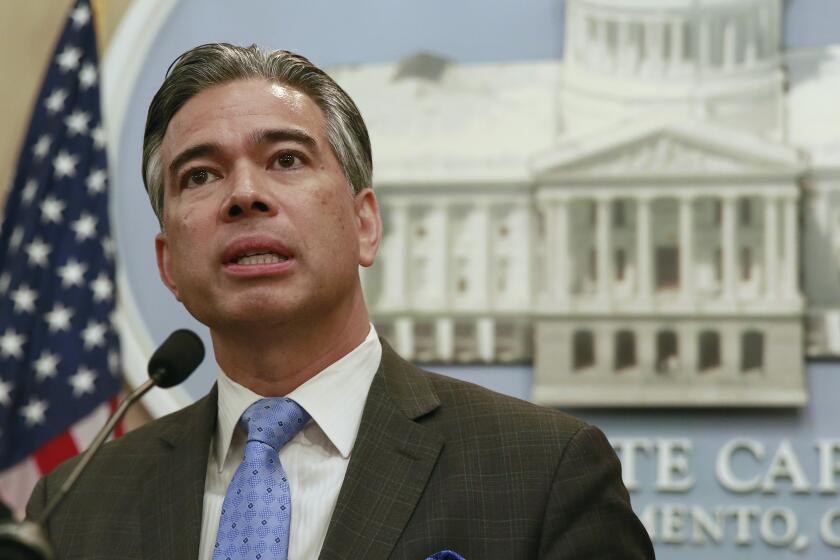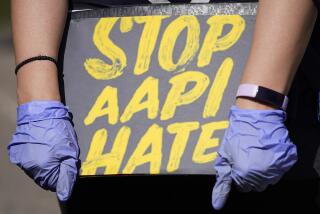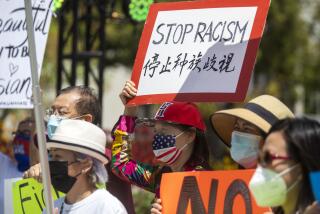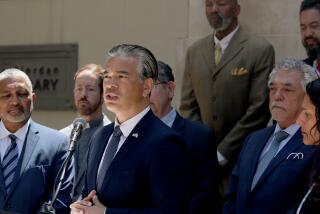California’s first Filipino American attorney general weighs in on anti-Asian racism
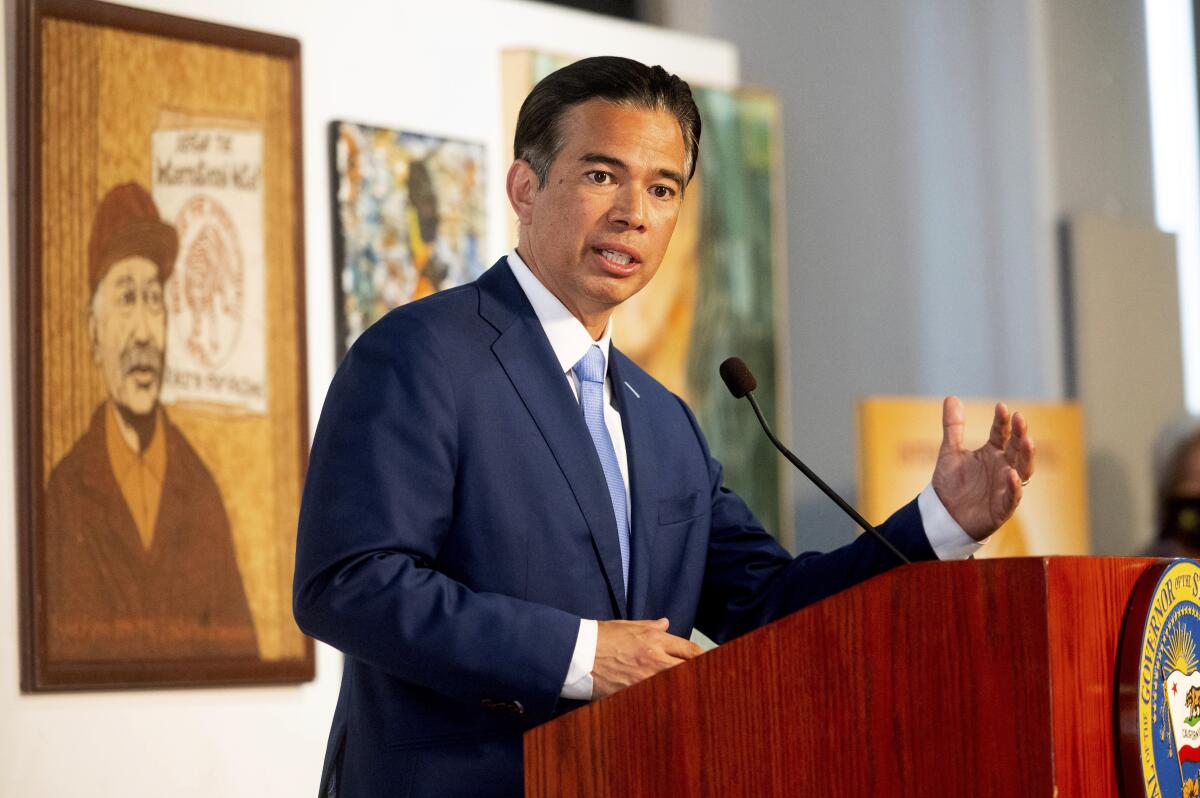
Rob Bonta, California’s new attorney general, is known as a leading advocate for criminal justice reform.
From defending the state’s gun control laws to investigating fatal police shootings to eliminating cash bail and reducing incarceration, his work is cut out for him in that realm.
As the first Filipino American to hold the office, Bonta has another top priority — fighting anti-Asian racism at a time when hate attacks are rising up and down the state and across the nation. He plans to create a racial justice bureau to combat white supremacy and biased policing as well as to explore reparations for slavery.
In his office, he keeps a photo of a sign hung in a Stockton hotel lobby in 1920: “Positively no Filipinos allowed.”
Born in the Philippines, Bonta, 48, immigrated to the United States when he was 2 months old. As a child in the Sacramento area, he said, he was called racist names and never felt like he belonged.
His parents, Warren and Cynthia Bonta, shared stories about their activism over steaming bowls of sinigang, a Filipino stew. His father, who is white, marched with the Rev. Martin Luther King Jr. in Selma, Ala. His mother helped organize Filipino and Mexican American laborers for the United Farm Workers.
Bonta attended college at Yale, where he captained the soccer team, and he also earned his law degree there.
Before his election to the state Assembly, Bonta was a deputy city attorney for San Francisco and worked as a private attorney handling cases involving racial profiling and other mistreatment.
Bonta, a Democrat, was elected to the California Assembly in 2012 as its first Filipino American member.
His April confirmation to the state’s highest law enforcement office came after Asian American leaders called on Gov. Gavin Newsom to choose someone who would prioritize fighting anti-Asian attacks.
Skeptics who say the American dream is no longer possible need only look at Rob Bonta, 49, who was chosen Wednesday by Gov. Gavin Newsom to be the next attorney general of California, columnist George Skelton writes.
In the last year, verbal and physical attacks on Asian Americans have escalated, with some people blaming them for the COVID-19 pandemic because of its origins in China.
In an interview with The Times focusing on anti-Asian hate, Bonta referred to the situation as a “full-on state emergency.”
This conversation has been edited for length and clarity.
What do you think are the issues with current hate crime laws, and is there a way they can be rewritten to hold perpetrators more accountable?
There are many approaches that need to be taken to address the state of crisis that we’re in. Definitely it’s all hands on deck; everybody can do something, including Congress and the federal government with their hate crimes bill, certainly even including leaders at the community, state, national level in how we speak about one another and our togetherness. We had someone in the White House who used the biggest bullhorn in the planet to push out messages of hate, intolerance and cruelty and xenophobia, and we’re suffering from that now.
We need to make sure that law enforcement is best equipped to identify and investigate hate crimes because we know that what are actually hate crimes are not always investigated as such — and pursued as such. We need to make sure that we have strong relationships between law enforcement and communities so that community victims and witnesses feel comfortable coming forward reporting hate crimes. Providing support like cultural competence and language-access services can be very helpful in that regard. We need to be victim-centered and provide support for victims so that they can heal, including access to the compensation funds, to health services.
We need to make sure we’re fully tracking and reporting. We know that these numbers that we’ve seen, high as they are, and shockingly high as they are, are still underreported. And as to our hate crimes laws on the books, we need to use those tools that are in the toolbox and hold perpetrators of hate accountable and to help victims heal, and we’re not fully using everything that we have now.
In your view, is there an actual increase in hate crimes this year, or is a lot of it people being more willing to report? How can we classify cases like the Bay Area assaults against elderly victims in which the attacker didn’t say anything racist?
I think it’s definitely an increase — definitely an increase. It tracks very consistently with COVID, and the numbers from March 2020 to March 2021 are way too high. I think we’re going to see estimates that are much higher than that. I think the actual incidents are much higher.
The idea that APIs [Asians and Pacific Islanders] are disease-carrying people is a stereotype that’s been around a long time. In economically difficult times, folks are often encouraged to point the finger and lay blame on certain groups.
I think we need to do a full and thorough investigation of each case. Certainly, when you see a pattern of API seniors being attacked, there needs to be a sensitivity to the possibility of the incident being a hate crime. There could be a word said at the time of the action that revealed it’s a hate-fueled act.
Has anyone in your family or inner circle been affected by the increasing violence?
What happened to [former President] Obama about the birther [conspiracy theory] has been leveled at me. Growing up, words like “g—,” “c—” and “monkey” have been directed at me. That’s what it means to be in my skin.
Seeing our seniors now, being pushed to the ground, including right here in my [old] district in Oakland Chinatown reminds me that this moment is creating a lot of wounds and reopening old ones as well.
The Asian American community is fearful, is in pain, is anxious and looking for help and support and champions. Attacking the forces of hate against the API community is a top priority for me. I value our API community. I see our API community. They deserve nothing less. I will fight with them and for them and by their side. I want to tell them, “You have an API leader in the California state attorney general.”
You made history with this job, but for far too long, API voices have been left unheard. What must change to spark political activism within this demographic and promote inclusivity?
Sometimes, people don’t see themselves having access to certain positions until they see someone who looks like them there. I’m honored to be a first. I can’t tell you how often and how intensely I’ve heard [from other APIs] that they have faith and trust in my work. I carry those expressions of support with a great deal of respect. Right now, we’re working with statewide API leaders to identify the best steps, co-creating solutions to address this state of emergency. I like opening a door that hadn’t been opened before and trying to pull the community with me.
More to Read
Sign up for Essential California
The most important California stories and recommendations in your inbox every morning.
You may occasionally receive promotional content from the Los Angeles Times.

